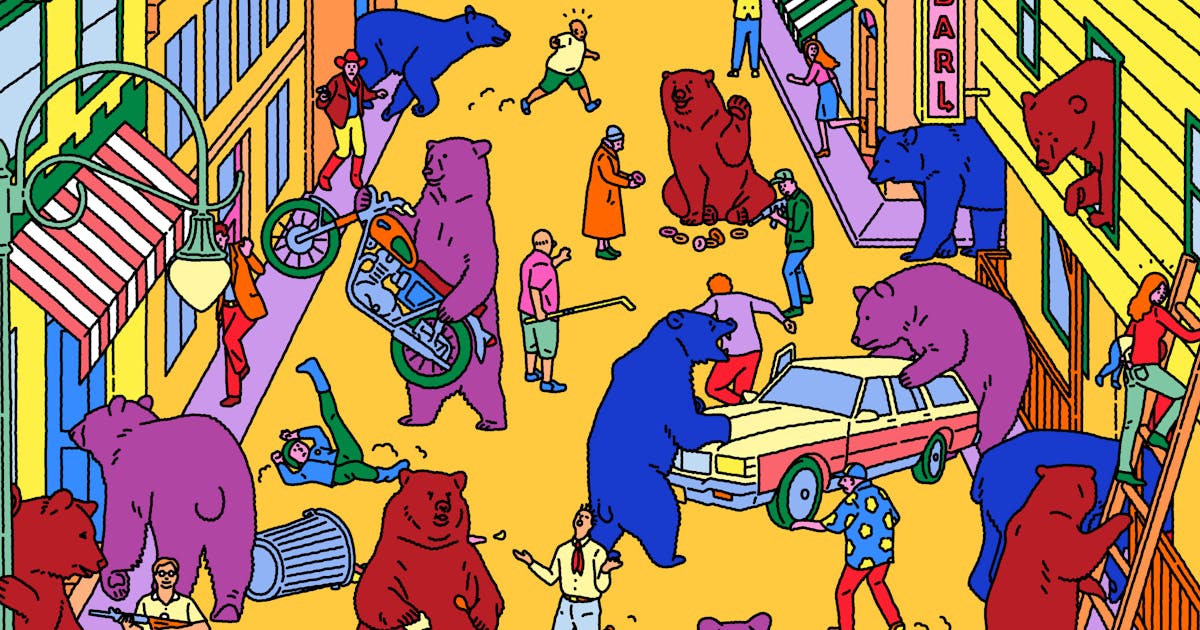- Joined
- Oct 22, 2002
- Messages
- 47,101
- Location
- Frozen in Michigan
- Gender
- Old Fart
- Basic Beliefs
- Don't be a dick.

The Town That Went Feral
When a group of libertarians set about scrapping their local government, chaos descended. And then the bears moved in.
Hongoltz-Hetling is an accomplished journalist based in Vermont, a Pulitzer nominee and George Polk Award winner. A Libertarian Walks Into a Bear: The Utopian Plot to Liberate an American Town (and Some Bears) sees him traversing rural New England as he reconstructs a remarkable, and remarkably strange, episode in recent history. This is the so-called Free Town Project, a venture wherein a group of libertarian activists attempted to take over a tiny New Hampshire town, Grafton, and transform it into a haven for libertarian ideals—part social experiment, part beacon to the faithful, Galt’s Gulch meets the New Jerusalem. These people had found one another largely over the internet, posting manifestos and engaging in utopian daydreaming on online message boards. While their various platforms and bugbears were inevitably idiosyncratic, certain beliefs united them: that the radical freedom of markets and the marketplace of ideas was an unalloyed good; that “statism” in the form of government interference (above all, taxes) was irredeemably bad. Left alone, they believed, free individuals would thrive and self-regulate, thanks to the sheer force of “logic,” “reason,” and efficiency. For inspirations, they drew upon precedents from fiction (Ayn Rand loomed large) as well as from real life, most notably a series of micro-nation projects ventured in the Pacific and Caribbean during the 1970s and 1980s.
Nearly two and a half centuries later, Grafton has become something of a magnet for seekers and quirky types, from adherents of the Unification Church of the Reverend Sun Myung Moon to hippie burnouts and more. Particularly important for the story is one John Babiarz, a software designer with a Krusty the Klown laugh, who decamped from Big-Government-Friendly Connecticut in the 1990s to homestead in New Hampshire with his equally freedom-loving wife, Rosalie. Entering a sylvan world that was, Hongoltz-Hetling writes, “almost as if they had driven through a time warp and into New England’s revolutionary days, when freedom outweighed fealty and trees outnumbered taxes,” the two built a new life for themselves, with John eventually coming to head Grafton’s volunteer fire department (which he describes as a “mutual aid” venture) and running for governor on the libertarian ticket.
Although John’s bids for high office failed, his ambitions remained undimmed, and in 2004 he and Rosalie connected with a small group of libertarian activists. Might not Grafton, with its lack of zoning laws and low levels of civic participation, be the perfect place to create an intentional community based on Logic and Free Market Principles? After all, in a town with fewer than 800 registered voters, and plenty of property for sale, it would not take much for a committed group of transplants to establish a foothold, and then win dominance of municipal governance. And so the Free Town Project began. The libertarians expected to be greeted as liberators, but from the first town meeting, they faced the inconvenient reality that many of Grafton’s presumably freedom-loving citizens saw them as outsiders first, and compatriots second—if at all. Tensions flared further when a little Googling revealed what “freedom” entailed for some of the new colonists. One of the original masterminds of the plan, a certain Larry Pendarvis, had written of his intention to create a space honoring the freedom to “traffic organs, the right to hold duels, and the God-given, underappreciated right to organize so-called bum fights.” He had also bemoaned the persecution of the “victimless crime” that is “consensual cannibalism.” (“Logic is a strange thing,” observes Hongoltz-Hetling.)
While Pendarvis eventually had to take his mail-order Filipina bride business and dreams of municipal takeovers elsewhere (read: Texas), his comrades in the Free Town Project remained undeterred. Soon, they convinced themselves that, evidence and reactions to Pendarvis notwithstanding, the Project must actually enjoy the support of a silent majority of freedom-loving Graftonites. How could it not? This was Freedom, after all. And so the libertarians keep coming, even as Babiarz himself soon came to rue the fact that “the libertarians were operating under vampire rules—the invitation to enter, once offered, could not be rescinded.” The precise numbers are hard to pin down, but ultimately the town’s population of a little more than 1,100 swelled with 200 new residents, overwhelmingly men, with very strong opinions and plenty of guns.
If the Libertarian vision of Freedom can take many shapes and sizes, one thing is bedrock: “Busybodies” and “statists” need to stay out of the way. And so the Free Towners spent years pursuing an aggressive program of governmental takeover and delegitimation, their appetite for litigation matched only by their enthusiasm for cutting public services. They slashed the town’s already tiny yearly budget of $1 million by 30 percent, obliged the town to fight legal test case after test case, and staged absurd, standoffish encounters with the sheriff to rack up YouTube hits. Grafton was a poor town to begin with, but with tax revenue dropping even as its population expanded, things got steadily worse. Potholes multiplied, domestic disputes proliferated, violent crime spiked, and town workers started going without heat. “Despite several promising efforts,” Hongoltz-Hetling dryly notes, “a robust Randian private sector failed to emerge to replace public services.” Instead, Grafton, “a haven for miserable people,” became a town gone “feral.” Enter the bears, stage right.
Pressed by bears from without and internecine conflicts from within, the Free Town Project began to come apart. Caught up in “pitched battles over who was living free, but free in the right way,” the libertarians descended into accusing one another of statism, leaving individuals and groups to do the best (or worst) they could. Some kept feeding the bears, some built traps, others holed up in their homes, and still others went everywhere toting increasingly larger-caliber handguns. After one particularly vicious attack, a shadowy posse formed and shot more than a dozen bears in their dens. This effort, which was thoroughly illegal, merely put a dent in the population; soon enough, the bears were back in force.
Meanwhile, the dreams of numerous libertarians came to ends variously dramatic and quiet. A real estate development venture known as Grafton Gulch, in homage to the dissident enclave in Ayn Rand’s Atlas Shrugged, went belly-up. After losing a last-ditch effort to secure tax exemption, a financially ruined Connell found himself unable to keep the heat on at the Meetinghouse; in the midst of a brutal winter, he waxed apocalyptic and then died in a fire. Franz quit his survivalist commune, which soon walled itself off into a prisonlike compound, the better to enjoy freedom. And John Babiarz, the erstwhile inaugurator of the Project, became the target of relentless vilification by his former ideological cohorts, who did not appreciate his refusal to let them enjoy unsecured blazes on high-wildfire–risk afternoons. When another, higher-profile libertarian social engineering enterprise, the Free State Project, received national attention by promoting a mass influx to New Hampshire in general (as opposed to just Grafton), the Free Town Project’s fate was sealed. Grafton became “just another town in a state with many options,” options that did not have the same problem with bears.
Interesting article on how some uninvited Libertarians decended on a small New Hampshire town and ruined it for everybody. Well worth a read of the whole piece.

